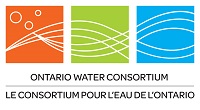
Brenda Lucas, SOWC Executive Director welcomes the audience within her opening remarks
On June 17, SOWC and IBM Canada co-hosted an International Water and Environmental Management Knowledge Symposium. The open exchange focused on integrated water and environment management challenges, solutions, best practices and innovative partnerships and marked the launch of the SOWC’s data integration platform.
The platform is now live for users to access, visualize and manipulate data streaming from the Grand River.
“SOWC has developed a network of instrumented ‘field laboratories’ for monitoring and investigating integrated hydrologic processes at the watershed scale,” said Dr. Dave Rudolph, Professor of Earth and Environmental Science and SOWC Watershed Node Leader to an audience of local and international water and environment experts. “The platform allows us to collect near real-time data and visualize it, manage more than 120 sensors deployed in the field, and be instantly alerted to environmental events within the watershed providing vital information to those responsible for regional water management to make more informed decision into the future.”
The newly launched data integration platform joins an elite group of projects changing the face of water monitoring across the globe including symposium participants Digital Delta, a breakthrough project based in the Netherlands that harnesses insights from Big Data to transform flood control and management of the entire Dutch water system.

Panelists discussed the topic Enabling Resilient Water Systems, identifying key messages and themes from the day
Digital Delta allows the integration and analysis of water data from a wide range of existing data sources. The initiative provides water experts with a real-time intelligent dashboard to harness information enabling it to be shared immediately across organizations and agencies. Similar to SOWC’s data integration platform, Digital Delta harnesses data visualization and deep analytical insights that can help prepare for impending difficulties, enabling authorities to coordinate and manage response efforts and enhance the ongoing efficiency of overall long-term water management.
The Digital Delta project and SOWC’s data integration platform involved collaborations with IBM.
Several other presentations took place throughout the day including Dr. Mario Schirmer, of the Swiss Federal Institute of Aquatic Science and Technology who spoke about his four-year inter- and trans-disciplinary research project on many aspects of river restoration, including investigation of the coupled ecological, hydrological and social dynamics in restored and channelized corridors of a river at the catchment scale.
A panel moderated by Jean-Francois Barsoum, IBM Canada Ltd., featured Bernadette Conant, Canadian Water Network; James Thomas, Desert Research Institute (Nevada); and Emily Moore, Hatch Ltd. Panelists discussed the topic Enabling Resilient Water Systems and helped to identify key messages and themes from the day.

SOWC presented live demos allowing participants to interact with the data integration platform
SOWC’s data integration platform was also featured by IBM Canada at a booth at the Canadian Water Summit. A live demo allowed participants to interact with the platform. Odum Idika, SOWC data integration platform manager, took booth visitors through the intricacies of the platform, providing a visual demonstration of the website, manipulating incoming watershed data in near real-time.
“With 14,400 measurements of data streaming in per day, we currently have massive amounts of information to work with, but that material doesn’t answer a specific question,” said Idika as he provided an overview of the data integration platform’s capabilities. “When potential users want to study a specific aspect of the watershed, through our API we can feed them the specific data they need to help them answer their questions.”
“Where can we take the platform for users?” asked Idika. “To infinity and beyond.”

